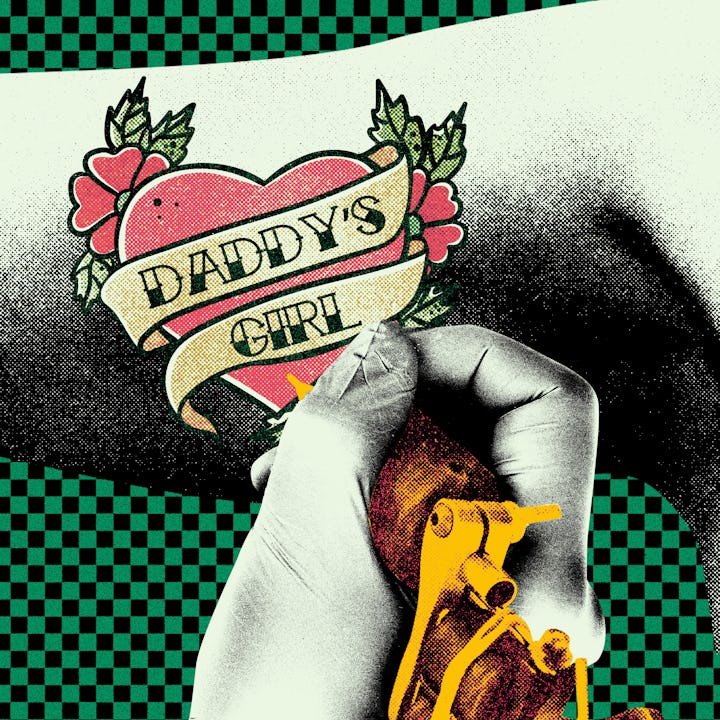Seriously, Stop Calling Kids ‘Daddy’s Girl’ And ‘Mama’s Boy’
It’s not fair to the kid or the parents.

The first time my daughter was called a daddy’s girl I nearly screamed. She was five months old, so I was barely out of my fourth trimester and still in the thick of adjusting to motherhood. The offender was a friend of a friend. I can’t even remember why he made the flippant comment, but I’ll never forget it: “You know, she’ll probably be a daddy's girl,” he said. “All girls are daddy’s girls.” I was livid.
My mind immediately jumped to imagined future scenarios where my daughter would prefer her father over me. In these sad fantasies, she would resist and reject my attempts to love her, teach her the ropes of life, and create special moments between the two of us. Instead she would reach for her father, shunning me endlessly. I was off and running, catastrophizing like the wind.
One would think this terminology was new to me, but it wasn’t. A quick look at any place children are shown — social media, TV, in real life — and you’ll see the labeling. And I’d argue that just about every well-meaning adult has likely placed someone’s child into the category of daddy's girl or mama's boy. I think it happens for a few reasons. For one, society loves a label. It gives us a sense of comfort and ease. It doesn’t necessarily come from a bad place, either. And, sometimes it’s a reflection of how people think about themselves and others; if you had a really close relationship with your mom or dad, you might project that onto somebody else.
But I hate it, and it’s harmful for a lot of reasons. To begin with, it tends to alienate and discredit the love and hard work the other parent has likely put into raising that child. Plus it’s plain ol’ hurtful. When I was told my daughter would automatically be a daddy’s girl, the person who delivered the comment was ignorant to how it would make me feel, and as a non-parent, they were oblivious to the amount of love and intention I have chosen to parent with, to establish a strong relationship with my child.
It also plays into society's gender norms, which as we know are outdated. Calling someone a daddy’s girl or mama’s boy is just another way to restrict their gender identity into what is considered to be appropriate, especially with young children. Who knows how that child will grow up and choose to identify, feel, or be.
There’s also a slightly negative charge to the term. A daddy’s girl tends to mean that the child is very girlish — dainty, youthfully feminine, and also spoiled. Those labeled mama’s boys are seen as society’s definition of weak and emasculated.
Besides the societal gripes I have with this phrasing, I have my own deeply personal issues with it that I’ve had to confront. As a kid, my father was absent, and while it would make sense for me to have a close relationship with my mother as my sole caregiver, that hasn’t been the case. Our relationship was rocky growing up and we’re estranged to this day. To say I felt like a lone wolf during my coming-of-age years wouldn’t be a stretch. As I got ready to have kids, I became afraid of having a daughter, painfully aware of that narrative that moms and their girls inevitably butt heads.
But, I wanted things to be different for me and my daughter. I want things to be different for me and my daughter. I’m committed to raising my daughter in a way that creates a healthy, positive foundation that bleeds into our relationship as adults. I’m focused on breaking unhealthy cycles within my family, and working — through therapy and healing — to examine areas of my life that need to change, so I can be a better woman and mother for my daughter. I know I won’t be perfect, but I’ll damn sure try my best to be the mother I needed as a young girl.
When that friend of a friend dubbed my daughter a future daddy’s girl, I was at home with her day and night after her father went back to work full time, eight weeks into our parenthood journey. I was unexpectedly laid off from my job of four years, so my 22-week maternity leave turned into an indefinite at-home stay. Any stay-at-home parent will tell you that it’s not an easy job. You're essentially multitasking nonstop when you're caring for a child, tending to the maintenance of a household, and somehow managing to do basic self upkeep like shower, eat, and rest in between. It’s beautiful, but it’s also exhausting. It’s quite possibly the absolute last time you want to sit there and listen while somebody tells a story about how you’re going to be less important to your kid than your partner.
So, to anyone looking to project their experience or view of what parent a child gravitates to more: Don’t. It has no real value. The only thing that does matter is that the child is loved abundantly and raised with the utmost care. And that’s what my family and I plan on doing.
Shanetta McDonald is a Los Angeles-based marketing executive and freelance writer who seeks to tell stories that are typically untold from a BIPOC perspective, about motherhood, body image, wellness, and career. Her work has been featured on InStyle.com, Refinery29, Bust and Miss Grass. Follow her on Instagram for more story updates.